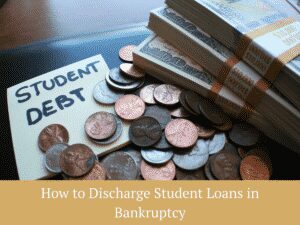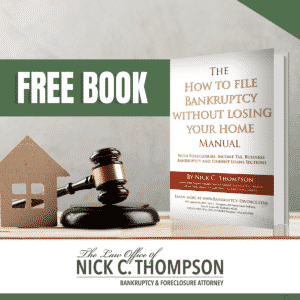Private student loans must go to court to garnish wages. Many defenses exist to defeat their lawsuits, such as the statute of limitations. But federal student loans have the right to start a garnishment without going through the first step of filing a lawsuit. Also, there are statutes that avoid many defenses like the statute of limitations. However, the federal student lender still has to go through certain steps.
Some of the private collection agencies that attempt to collect for the federal lenders may misrepresent that they can garnish wages or attach property without due process. That’s false. It’s also a basis to sue them for a violation of the Fair Debt Collection Practices Act. However, there is a process in place to garnish your wages for a federal student loan.
Stop Federal Student Loan Wage Garnishment
Private lenders sue first to garnish wages. However, you can sue private lenders back for several reasons. But even the federal loans have limits. Since 1996 the Debt Collection Improvement Act states the Department must mail a notice 30 days before garnishing wages. The notice must include the nature, amount, and the intent to garnish wages. This doesn’t guarantee you receive a notice but they must send it.
When you receive a notice, these are your right as follows:
- Inspect and copy their records.
- Make a repayment agreement instead.
- Or, request a hearing about the existence, amount, or enforceability of the debt, rate of withholding, and whether employed less than twelve full months after losing a job.
- The hearings may be by telephone or in-person.
Any of these actions delay the process while you check out other options. For instance, you might file a Chapter 13 with just a minor $100 a month payment rather than lose 25% of your income. If you request a hearing before the 13th day of receiving the notice, then, the garnishment cannot proceed until after the hearing.
Student loan garnishment is serious. As an example, in one of my cases, the taxes took 25% of her income, state student loans another 20%, and federal another 20% for a total of 65%. After insurance almost nothing was left. A simple $100 a month Chapter 13 cured the problem. Then, after 10 years she will simply apply for the federal disability discharge of her debt.
⎆ Collections & student loan wage garnishment.
If a student loan is not dischargeable in bankruptcy, then, of course, you must manage it. Managing governmental loans is easy due to the numerous programs to avoid default.
However, once the loan is in default, the government has strong collection powers. In fact, it can seize tax refunds, garnish wages, garnish government benefits such as social security, attach real estate and property through the Department of Justice lawsuits, and seize bank funds.
⎆ The statute of limitations.
The statute of limitations does not apply to government student loans 20 U.S.C. § 1091a(a). But a government student loan cannot garnish more than 10% of wages under 59 Fed. Reg. § 22473. Disability, closed school, and other “administrative” discharges are available for federal student loans.
Each state has a statute of limitations that applies to private student loans. A private student loan is no different from a credit card debt and all the state defenses such as the statute of limitations apply to these private student loans. In fact, the statute of limitations is the most common defense. In some states, the statute of limitations is only 3 years and 5 years in most states. Refinancing restarts the clock on the statute of limitations for a new loan. In Kentucky, it starts a new 15 years for the statute of limitations to run.
⎆ Department of Education programs.
DOE has many programs that allow you to avoid collections and keep a loan out of default. Department of Education (DOE) loans do not generally go into default until they are 270 days overdue. Private loans and Perkins loans technically may be in default the day after the due date.
Numerous penalties kick in when government loans go into default so you must avoid that. For instance, if your government student loan is in default you will not qualify for an FHA, VA, Kentucky Housing Corporation, or federally insured home mortgage. It also adversely affects interest rates and how your employer sees you.
⎆ Dealing with collectors and wage garnishment.
Remember you can sue collectors for FDCPA violations. That’s right—you can sue debt collectors back. However, the loan isn’t collectible by a debt collector until it is in the hands of a 3rd party collector who is handling the loan while it is in default.
Furthermore, Government lenders have a duty to explain and help you with IBR applications, but they don’t receive financial compensation for that. Since they get their pay for collecting late fees don’t expect them to look out for your best interests.
Sometimes, government student loans can pay off at the expense of private unsecured debt. This is especially true if government loans classify as “business expenses” under 1325(b) 2 or have terms longer than five years. Thankfully, the bankruptcy code allows debtors to pay long-term, non-dischargeable debts in Chapter 13 plan at the normal monthly payment. This may save co-signers at the expense of unsecured debts.
You must remember that collection agencies receive their pay for collecting student loans. They often “flip” (refinance) loans into new loans to earn commissions for a new loan.
Therefore, refinancing the loan makes collectors the maximum profit. The amount the student owes increases, and this prevents the statute of limitations from running for private student loans. This results in the trusting student ending up with a new loan worse than the old one.
The best way to keep your wages from being garnished is to not let your loan go into default. Instead, call me today. I am here to help you.
Resources for Student Loans
 Other Related Information
Other Related Information
Current Student Loan Interest Rates
Government Student Loan Garnishments and Collections
Student Loan Statute of Limitations
Kentucky Statute of Limitations
How to stop student loan collections and garnishments
Do you need help managing your student loan? Contact my office right away to start the conversation. Nick C. Thompson, Attorney: 502-625-0905




